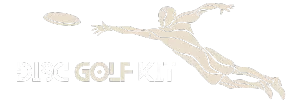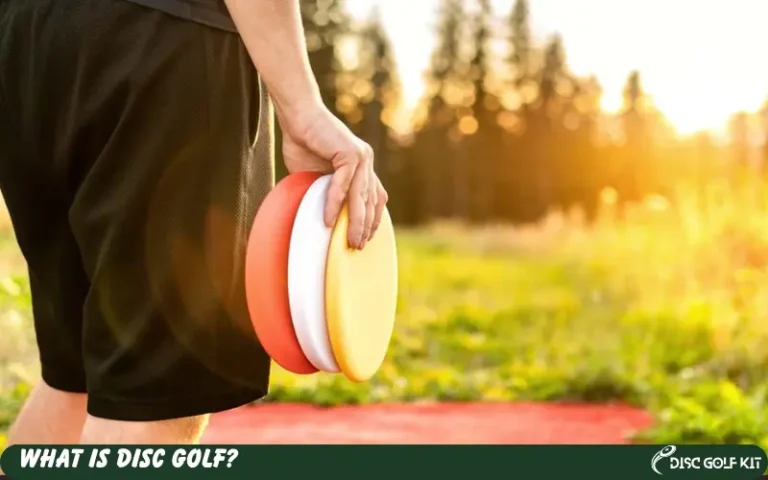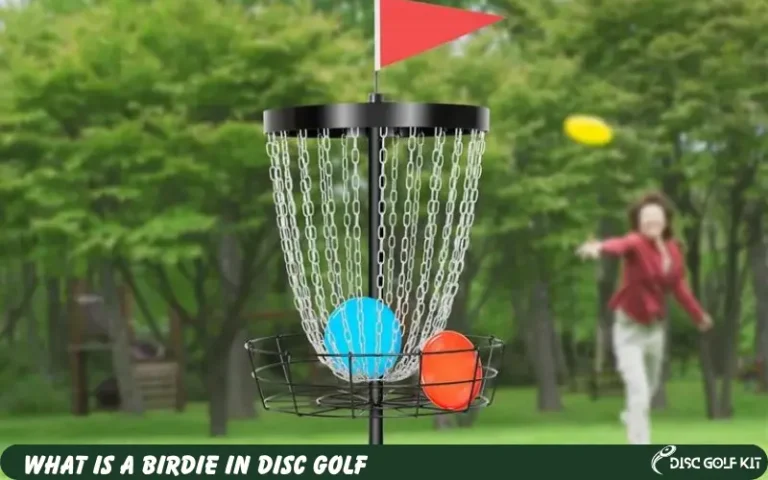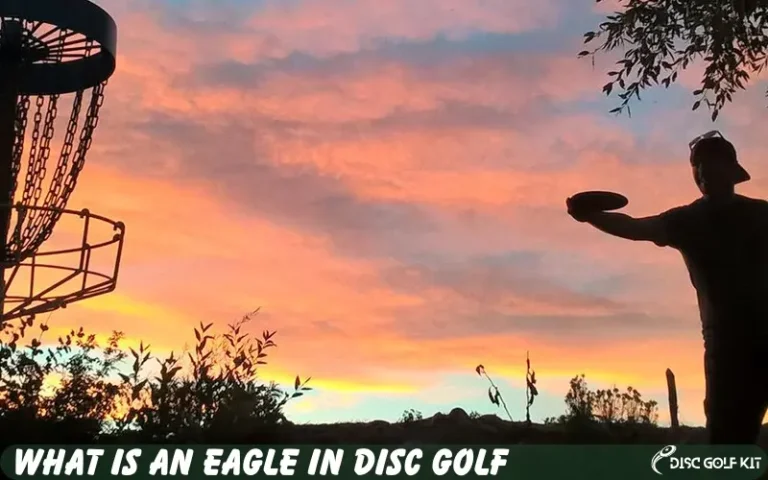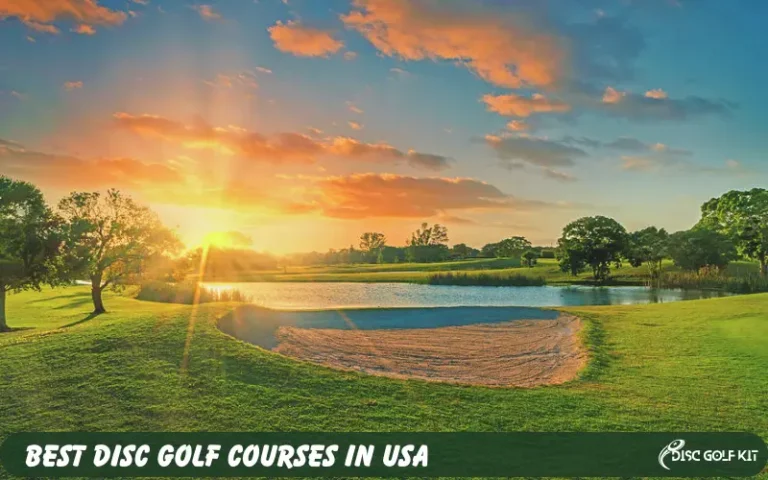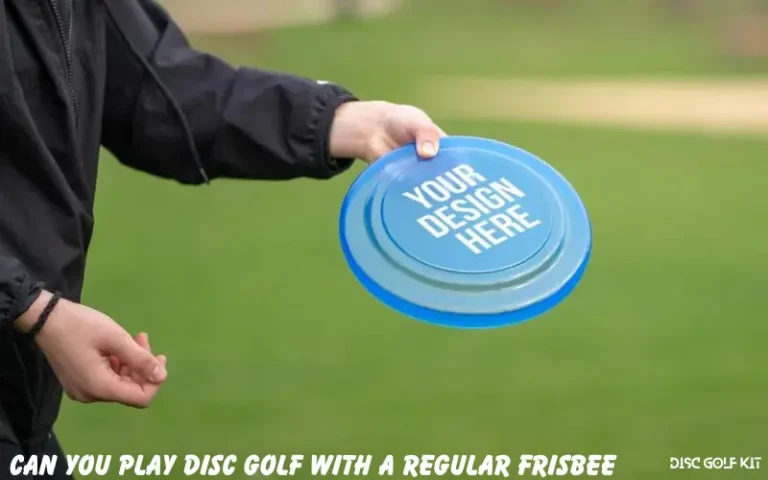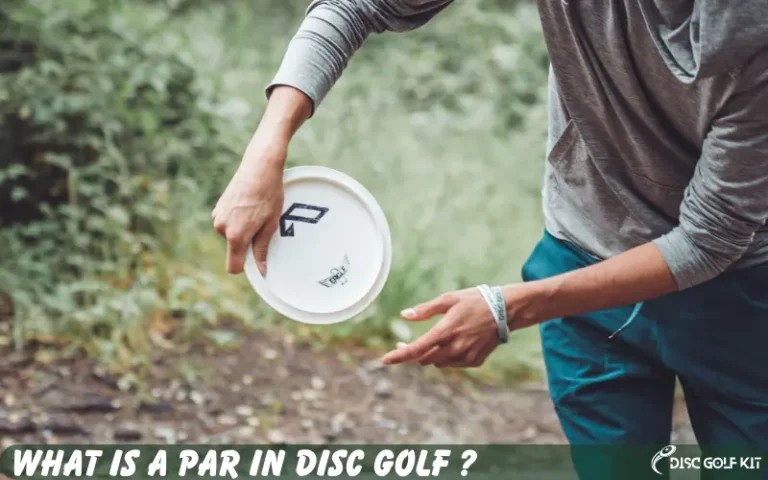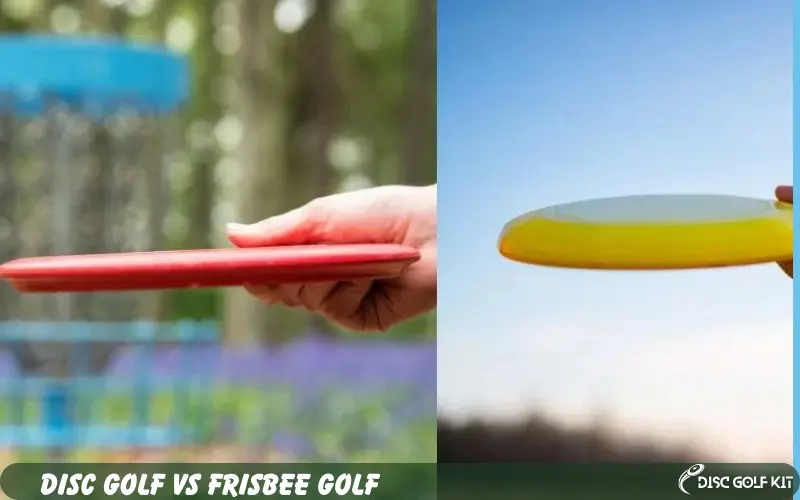
Disc Golf and Frisbee Golf refer to the same sport, and the terms are often used interchangeably. The game involves players throwing a disc at a target, usually a metal basket, with the aim of completing a course in the fewest number of throws. While “Disc Golf” is the official name of the sport governed by the Professional Disc Golf Association, “Frisbee Golf” is a colloquial term that gained popularity due to the ubiquity of the Frisbee brand.
However, it’s worth noting that discs used in disc golf are typically smaller and denser than traditional Frisbees, designed for greater accuracy and distance. Both terms describe a sport that combines elements of traditional golf and Frisbee-throwing, offering an accessible yet challenging outdoor activity.
Are you scratching your head, puzzled over the difference between Disc Golf Vs Frisbee Golf? You’re not alone. These two sports often get muddled together, confusing for newbies and enthusiasts alike. It’s easy to think they’re the same, given the similar equipment and playing fields. But don’t worry; by the end of this article, you’ll have a comprehensive understanding of Disc Golf vs. frisbee Golf, from the key terms to the distinct rules that set them apart. So, let’s demystify these two.
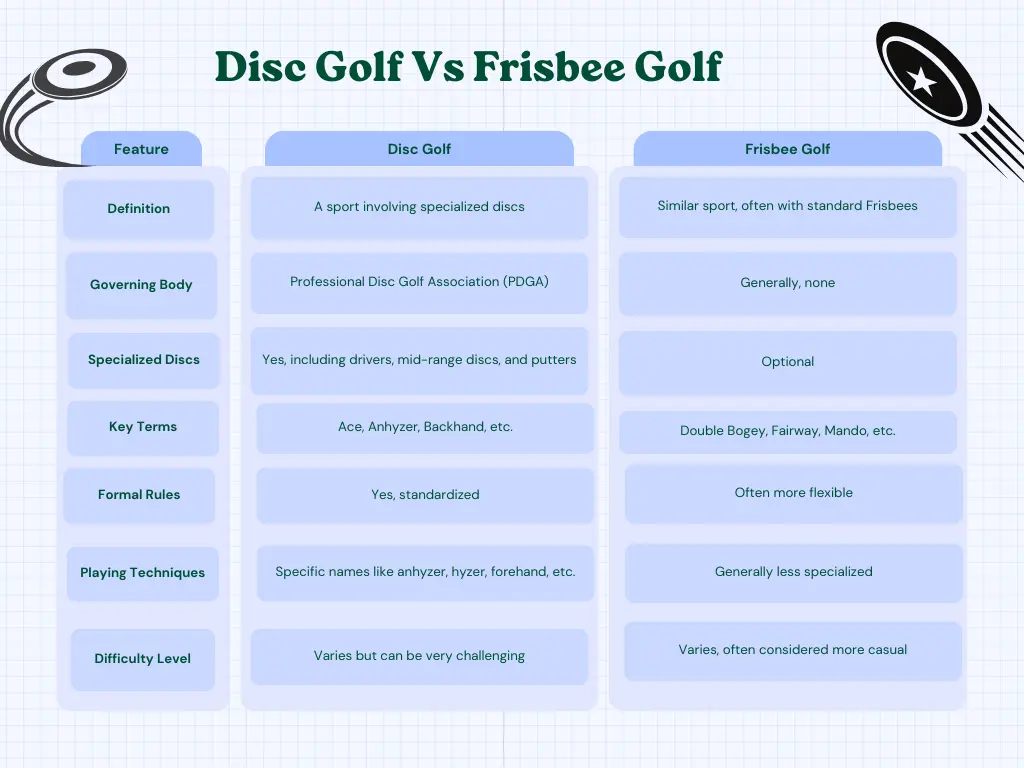
What is Disc Golf?
Disc Golf is a sport that involves players throwing a flying disc toward a series of metal baskets situated throughout a course. Unlike traditional golf, which uses balls and clubs, disc golf employs specialized discs made for different types of throws and distances.
Brief History
Disc Golf has its roots in the early 20th century but gained significant traction in the late 1960s and early 1970s in the United States. Over the years, it has evolved into a professional sport with a devoted following governed by bodies like the Professional Disc Golf Association (PDGA). Today, it is played worldwide, with thousands of courses and tournaments that attract players of all skill levels.
Explanation of the Objective of Disc Golf
The primary objective in disc golf is quite similar to its namesake, traditional golf. Players aim to complete each hole in the fewest number of throws. A hole, in this case, is a metal basket with hanging chains designed to catch the disc. Courses often feature 9, 18, or more holes, each with varying levels of difficulty due to different distances, terrains, and obstacles. The player who completes the course with the fewest total throws wins the game.
With this knowledge, you’re one step closer to fully understanding the difference between Disc Golf Vs Frisbee Golf. So, let’s move on to the next topic to bring the whole picture into focus.
What is Frisbee Golf?
Frisbee Golf, also commonly referred to as “frolf,” involves players throwing a Frisbee or flying disc towards a target, which is often a metal basket similar to those used in disc golf. The sport has casual origins, and players frequently adapt existing outdoor spaces like parks to serve as makeshift courses.
Is it the Same as Disc Golf?
At first glance, Disc Golf and Frisbee Golf may seem identical, given their similar objectives and equipment. However, they are distinct sports with some key differences. For starters, Frisbee Golf traditionally utilizes general-purpose Frisbees, whereas Disc Golf employs specialized discs designed for specific types of throws and distances.
History and Key Differences from Disc Golf
Frisbee Golf also has roots dating back to the 20th century, but its formalization as a sport lagged behind that of Disc Golf. One primary difference in Disc Golf Vs Frisbee Golf is the level of professional governance; while Disc Golf has formal associations like the PDGA, Frisbee Golf is often more casual and lacks a unified governing body. Additionally, the terminology, types of courses, and even the rules can vary between the two sports.
Disc Golf courses are specifically designed for the sport, featuring a range of par values and complex terrains. In contrast, Frisbee Golf courses are often improvised, utilizing natural obstacles like trees or bodies of water. This casual approach means that you’re more likely to encounter a Frisbee Golf setup in a general-use park rather than a specialized course.
Disc Golf Vs Frisbee Golf: Main Differences
Now that we’ve delved into the worlds of Disc Golf Vs Frisbee Golf, it’s time to pit them head-to-head. While both sports involve throwing a flying disc into a basket in the fewest throws possible, they have their quirks and features that set them apart. Let’s look at some of the main differences in Disc Golf Vs Frisbee Golf terms of equipment, rules, and playing techniques, as well as how they vary in popularity and recognition.
Comparison of Equipment, Rules, and Playing Techniques
Discussing How They Differ in Popularity and Recognition
Understanding these main differences between Disc Golf Vs Frisbee Golf will arm you with the knowledge to choose which sport suits you best or to enjoy both for their unique characteristics.
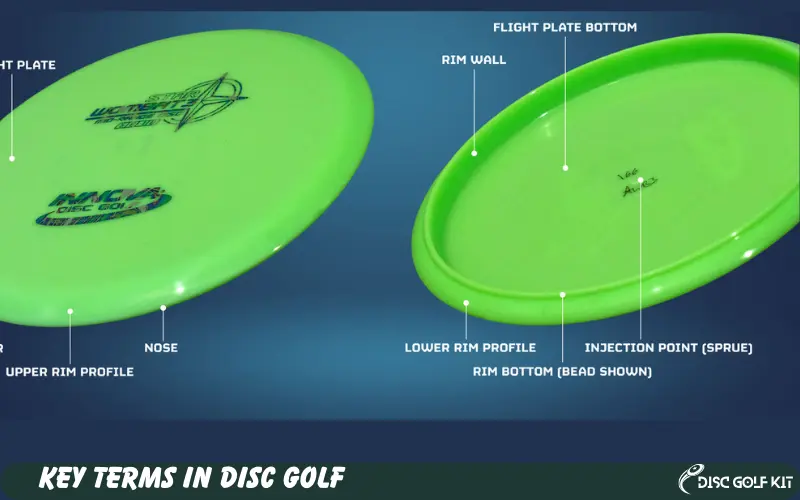
Common Myths and Misconceptions
Just as there’s a wealth of information about Disc Golf and Frisbee Golf, there’s also a host of myths and misconceptions that can easily confuse newcomers and even seasoned players. To set the record straight, let’s tackle some of the most prevalent myths surrounding these sports.
Frisbee Golf and Disc Golf are the Same
One of the most common misconceptions is that Frisbee Golf and Disc Golf are the same sport, simply going by different names. As we’ve discussed throughout this article, while they share some similarities, they are distinctly different sports with unique rules, equipment, and playing techniques. The simple equation of the two overlooks the richness that each sport brings to the table.
You Need Specialized Discs to Play
Another myth that often circulates is that you absolutely need specialized discs to play either of these sports. While it’s true that having specialized discs can improve your game in Disc Golf, they are not a requirement, especially for beginners. Many people enjoy the game with standard Frisbees or even discs borrowed from friends. Similarly, Frisbee Golf can be played with standard Frisbees, making it accessible for anyone interested in the sport.
Frisbee Golf is Easier than Disc Golf
Some people assume that Frisbee Golf is inherently easier than Disc Golf because it often lacks the formality and specialized equipment associated with the latter. This notion is misleading. The difficulty of either sport can vary greatly depending on the course layout, weather conditions, and even the skill level of the players.
Disc Golf is Only for Professionals
There’s a notion that Disc Golf is a sport exclusively for professionals or serious athletes. This is far from the truth. Disc Golf is incredibly accessible, with courses ranging in difficulty from beginner to professional levels. The community is generally welcoming, and there are plenty of resources for players of all skill levels.
By debunking these myths and misconceptions, we hope to clarify the nuances between Disc Golf Vs Frisbee Golf. Whether you are drawn to the formalized competition of Disc Golf Vs Frisbee Golf, there is a place for you in either of these vibrant communities.
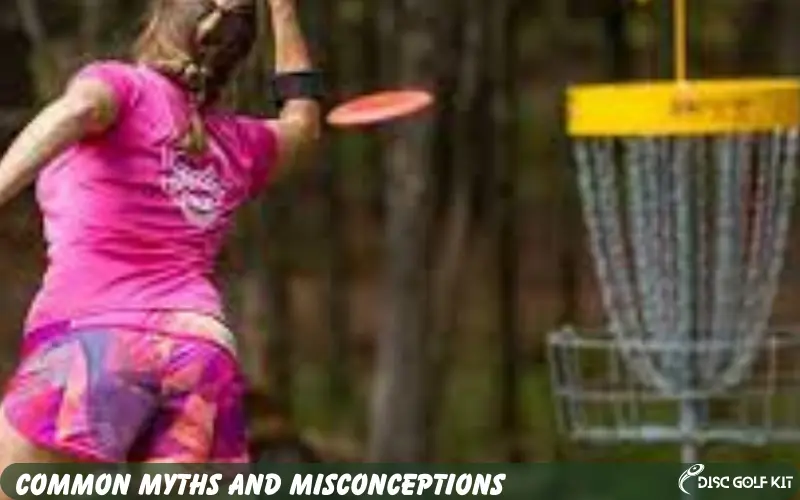
Conclusion
Navigating the worlds of Disc Golf Vs Frisbee Golf can initially seem like a daunting task, given their similarities. Still, as we’ve explored, each sport has its unique charm, rules, and terminology. Whether you’re drawn to the specialized discs and formalized rules of Disc Golf, or you find the laid-back, grassroots nature of Frisbee Golf more appealing, there’s undoubtedly a flying disc sport out there for you.
So, what are you waiting for? Now that you’re armed with this comprehensive knowledge about Disc Golf and Frisbee Golf, it’s time to hit the course! Whether you’re looking to engage in friendly competition or simply enjoy a day outdoors, these sports offer something for everyone. And remember, no matter which path you choose, it’s all about having fun and enjoying the game.
FAQs About Disc Golf Vs Frisbee Golf

Written by
Declan Hodgson
Meet Declan Hodgson, your disc golf sherpa at DiscGolfKit.com. Navigating the twists and turns of the sport, I’m here to guide you through the world of discs, gear, and the pursuit of that perfect throw.
